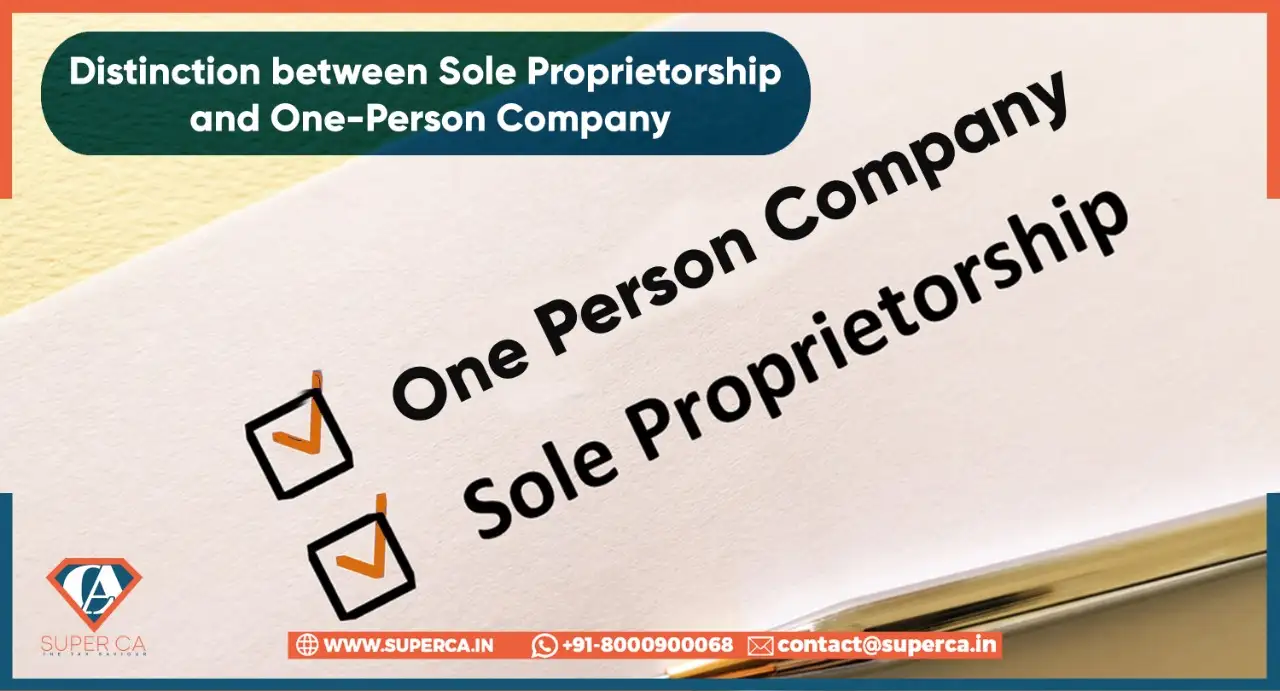Difference between Sole proprietorship and One Person Company


About
One Person Company and Sole Proprietorship are two different business structures & also are different in terms of their working but sometimes people get confused between them due to their similar sounding words. Let's make a clear distinction between both of them so that you’ll be able to pick the best suitable one.
One Person Company or OPC means a Company which has only one person as its member. It is a fusion of Sole-Proprietorship and Company form of business. In order to enable a person who is carrying on the business in the Sole-Proprietorship firm to enter into a corporate outline with relaxed or concessional requirements under the Act, the Companies Act 2013 had brought in the new concept of OPC.
Sole Proprietorship is a popular type of unregistered business institution owned, managed, and operated by a single person. Sole proprietorship is the “One Man Business Entity”. All the investments for the Sole Proprietorship business is done by the single proprietor who bears all the losses and enjoys all the profits. The overall control of the business as well as its management is in his hands. He can appoint individuals for conducting the business, but the ownership will rest solely with him.
Head to Head
Registration
In OPC, the company can be registered under MCA and Companies Act, 2013, whereas Sole Proprietorship Registration is not compulsory in general. It does not require any formal registration as such as it is identified through alternate registrations, such as GST registrations. A proprietor can register if he wants to register his company.
Legal Status
Unlike a partnership firm or corporation, sole proprietorship does not have any separate legal identity. It is a limited business structure that connects the business and the business owner. Proprietor and business are indistinguishable from a tax and legal point of view. OPC on the other hand is treated as a private company having a separate legal entity. It has the advantage of corporate status in society.
Compliance
In case of a one person company, the compliances are much more strict than proprietorship. This is because the company has to register annual returns, get its accounts audited, and meet other compliances of a Private Limited Company. It would also have to get accounts edited in the same manner as done by a private limited company. Whereas, In a sole proprietorship, In a sole proprietorship, the owner only needs to file the annual returns and the firm is required to get accounts audited only if the annual turnover crosses the threshold limit as specified under the provisions of the Income Tax Act.
Liability
Since, One Person Company is a separate legal entity, the owner has liability limited to the extent of share capital, in case the business suffers a loss. This is the most attractive reason why many individuals are opting for an OPC. Whereas, a sole proprietorship’s liability is unlimited, which means all the assets of the individual will be attached and there is no limitation on the liability. Also, Liability extends to his personal belongings as well.
Conversion
Conversion of Sole Proprietorship to Private Limited Company is possible but it’s a bit tiresome process. Whereas, the conversion of OPC to Private Limited Company is comparatively easy. OPC has to convert itself into a Private Limited Company if its paid-up share capital exceeds Rs.50 Lakhs and if its average turnover of any three consecutive financial years exceeds Rs.2 Cr.
Succession
In a sole proprietorship firm, since there is no distinction between the business firm and the owner, the succession is possible only through an execution of the will. Whereas, one person company must have a nominee designated by its members for the purpose of succession. Only a natural born citizen and a resident of India shall be eligible to be a nominee who in case of death of the member shall take his/her place. OPC is not affected by the death of the member and has continued succession.
Final Words
Both Sole Proprietorship and One person company are beneficial in their own terms. Both have their own merits and shortcomings. Hence, it solely depends upon the motive and objectives of the entrepreneur when it comes to selecting the type of business. In short we can say that the choice of business structure varies from person to person and business to business depending upon their intention.
Individuals who want to start a business from home or on a premise with a minimum amount can opt for Sole proprietorship business type. If you want to start a corporation with less compliance, then One Person Company is the best one for you. Ultimately, it’s your choice to choose between the two.

|
Essential LLP Registration Documents: A Complete Checklist for Entrepreneurs Author: Rahul Singh 04 Apr, 2024
|
Get inspired by these stories.